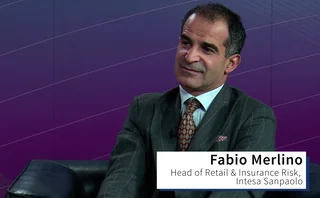
Spanish repository aims to launch service in July

The Spanish stock exchange, Bolsas y Mercados Españoles (BME), aims to launch the first phase of its trade repository for all classes of over-the-counter derivatives in July, says Jésus Benito, chief executive of Iberclear, the central depository for stocks in Spain owned by BME.
“At the moment, we’re planning to launch interest rates in July, then move on to other asset classes. By December, we’re aiming to have equities and maybe forex as well,” says Benito. “Clearly, plain vanilla contracts are the easiest to register, but in interest rates we are also looking to have the capacity to register bespoke contracts in the first phase of the project. Other trade repositories are offering a solution for plain vanilla contracts, but we are putting a lot of emphasis on the non-standardised contracts, as well as plain vanilla ones.”
The project envisages covering “every kind of contract and every kind of underlying”, says Benito. However, some market participants argue the venture is too ambitious, labelling it an attempt to cash in on the European Commission (EC) communication of October 20, 2009, which invited companies to establish trade repositories. Other ventures – notably Stockholm-based TriOptima for interest rates and US-based MarkitServ for equity derivatives – have focused on one asset class. Nonetheless, Benito is convinced BME can provide a complete service.
“Without doubt, it’s a challenge, but we’re specialists in trade registration at Iberclear, and we think once you’re registering one type of contract, you should be able to register the others too. Non-standardised contracts present the biggest challenge, but we’ve got imaginative solutions for this, which we will present when we make the public announcement,” he says.
BME revealed its intention to launch a trade repository for a wide range of OTC derivatives instruments on November 3, 2009. The news came out of the blue for many in the market. TriOptima and MarkitServ had both been selected via a process driven by the International Swaps and Derivatives Association, but BME was the first company to launch its own initiative without waiting for an official nod from the derivatives association. Benito says he has not talked to Isda so far, but is due to meet with representatives soon.
“I wouldn’t say it is a problem that BME wasn’t selected via an Isda process – it is a fact and we have to live with that. We have already presented the project to very important Spanish players, as well as to the EC and the European Central Bank, both of which were delighted there is a project with a completely European scope,” he says. “Clearly, the future is competition between repositories. We think our project is going to be comprehensive, as we’re looking across all asset classes and focusing on both the interbank market and the dealer-to-corporate market. We think it’s a niche in the market we can exploit.”
The idea of competition between repositories has not been universally welcomed. Some critics have suggested multiple repositories could lead to information duplication and increased operational risk. Benito dismisses such concerns, claiming the European Securities and Markets Authority (Esma), the body that will oversee trade repositories in the European Union, will ensure information is collated and shared appropriately.
“Esma will define the formatting standards for the way information is communicated. These formats will have to be followed by all trade repositories, and Esma will be the one receiving all the information. We also think trade repositories are interested in being interconnected: if a US bank registers a trade in the US while a Spanish bank on the other leg of the trade registers it with us, all parties have an interest in ensuring the repositories are interconnected so both receive confirmations that are exactly the same in both instances,” he says.
“I actually think it is better to have various trade repositories over one sole repository in the world, because if that one organisation has operational problems, clearly the lights will go out for all regulators – European and US. I think it is a business in which there should be competition,” he adds.
Benito says he has talked to a number of major Spanish players, which have helped to develop the functionality of the repository and provide feedback on the project. It appears domestic reaction has been positive so far.
“It may be an opportunistic move, but isn’t that the very nature of business? We will be using it when it is launched. Part of it is supporting local businesses, but BME is also a professional outfit with the experience and infrastructure to undertake this ambitious project,” says one senior Madrid-based banker.
Even if BME can only attract Spanish business, Benito says this will be enough to “ensure our existence”. However, this is clearly not the plan. “The project was born in Spain, but it is aimed at all of Europe – we are going to internationalise this project. We are aiming for the larger market, and we know there is stiff competition,” he says.
Only users who have a paid subscription or are part of a corporate subscription are able to print or copy content.
To access these options, along with all other subscription benefits, please contact info@risk.net or view our subscription options here: http://subscriptions.risk.net/subscribe
You are currently unable to print this content. Please contact info@risk.net to find out more.
You are currently unable to copy this content. Please contact info@risk.net to find out more.
Copyright Infopro Digital Limited. All rights reserved.
As outlined in our terms and conditions, https://www.infopro-digital.com/terms-and-conditions/subscriptions/ (point 2.4), printing is limited to a single copy.
If you would like to purchase additional rights please email info@risk.net
Copyright Infopro Digital Limited. All rights reserved.
You may share this content using our article tools. As outlined in our terms and conditions, https://www.infopro-digital.com/terms-and-conditions/subscriptions/ (clause 2.4), an Authorised User may only make one copy of the materials for their own personal use. You must also comply with the restrictions in clause 2.5.
If you would like to purchase additional rights please email info@risk.net
More on Infrastructure
Communications surveillance solutions 2024: market update
A report offering Chartis’ latest view of the vendor landscape for communications surveillance solutions
SIMONE, the AI that nearly took down a bank
An algorithm designed to create new structured products ran out of control last year with almost catastrophic consequences for a major bank, as our exclusive whistleblower account reveals
Revealed: where banks are (literally) warehousing their swaps
As derivatives notional grows, dealers experiment with novel storage solutions
E-trading takes hold for FX swaps – sort of
Bulk of trades are being executed over screen, but bolder changes have stalled
From DNA to DHA – Preparing for a new era of digital human augmentation
As technology increasingly permeates societies, cultures and everyday activities, its integration into people’s lives is having a profound impact on what is expected of people in the workplace. Deloitte examines this evolution of today’s workforce, the…
Risk and finance: Working more closely together
Video interview: Thomas Kimner, SAS
Video interview: Fabio Merlino, Intesa Sanpaolo
Fabio Merlino, head of retail and insurance risk discusses how the wealth management division of Intesa Sanpaolo upgraded its risk analytics capabilities with the algo system used by its proprietary traders
The changing face of Risk.net and our magazines
Extensive reader consultation has helped us reshape editorial teams and our site







